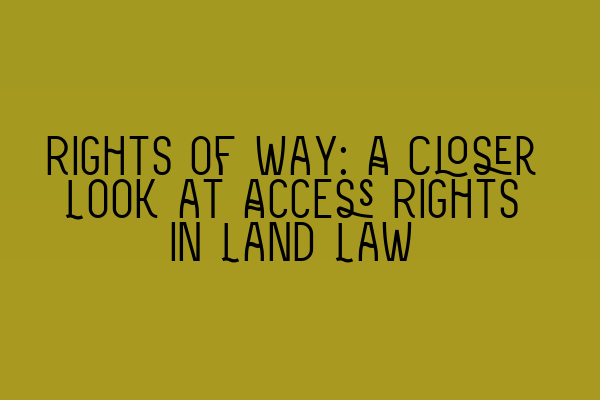Rights of Way: A Closer Look at Access Rights in Land Law
When it comes to property law, one important area to understand is the concept of rights of way. A right of way grants an individual or group the legal right to pass through a specific property, even if they do not own it. This can be a crucial aspect to consider when buying or selling property, as it can affect access, use, and value. In this article, we will take a closer look at rights of way in land law and explore some key points to consider.
Understanding Rights of Way
At its core, a right of way is an easement that allows a person or group to traverse a property that they do not own. This right can be granted to specific individuals, or it can be a general right for the public to access a certain area. It is important to note that a right of way does not grant ownership or exclusive possession of the land; it simply provides access.
In many cases, rights of way are created through formal legal processes, such as a deed or an agreement between the parties involved. However, rights of way can also be created through continuous use over a long period of time, known as “prescription” or “easement by prescription.”
It is essential for property owners and prospective buyers to understand whether a property has any existing rights of way, as this can impact its use and value. Additionally, if you are considering granting a right of way or have concerns about an existing one, seeking legal advice is advisable to ensure your rights are protected.
Types of Rights of Way
Rights of way can take various forms, depending on the specific circumstances and requirements. Here are some common types:
- Private Rights of Way: These are rights of way that are granted to specific individuals or groups. They are often created through formal agreements or deeds.
- Public Rights of Way: These are rights of way that are open to the general public. They can include public footpaths, bridleways, and other public routes designated for recreational or transport purposes.
- Appurtenant Rights of Way: These are rights of way that are attached to a specific property and benefit its owners or occupants. For example, a right of way may be granted to allow access to a landlocked property.
- Easements by Necessity: These are rights of way that are created by law to ensure necessary access to a property. For example, if a property is landlocked and has no other means of access, an easement by necessity may be granted.
Importance of Rights of Way in Property Transactions
When buying or selling property, it is crucial to consider any existing rights of way associated with the land. Not only can this affect the use and enjoyment of the property, but it can also impact its value. For example, if a property has a right of way that allows access to a popular beach or a nearby amenity, it can increase its desirability and potential market value. On the other hand, if a property has a restrictive right of way that limits access or use, it may affect its marketability and price.
As a buyer, it is essential to conduct thorough due diligence to identify any existing rights of way. This can involve reviewing title documents, surveying the land, and seeking legal advice. Sellers, on the other hand, should disclose any known rights of way to potential buyers to ensure transparency and avoid legal disputes in the future.
Resolving Disputes over Rights of Way
Unfortunately, disputes over rights of way are not uncommon. These disputes can arise due to various reasons, such as conflicting interpretations of the terms of the right of way, changes in land use, or disagreements between neighboring property owners.
If you find yourself in a dispute over a right of way, it is important to seek legal advice promptly. A solicitor experienced in property law can help assess the situation, analyze the relevant legal documents, and guide you through the resolution process. In some cases, mediation or negotiation can lead to a mutually acceptable solution. However, if a resolution cannot be reached, it may be necessary to take the matter to court.
Conclusion
Rights of way play a vital role in property law, providing individuals and the general public with access to land that they do not own. Understanding the different types of rights of way, their implications, and their potential impact on property transactions is essential for both buyers and sellers.
If you are involved in a property transaction or facing a dispute related to rights of way, seeking professional legal advice is strongly recommended. At SQE Property Law & Land Law, our team of experienced solicitors can provide you with the guidance and support you need to ensure your rights are protected. Contact us today to discuss your specific situation.
Related Articles:
